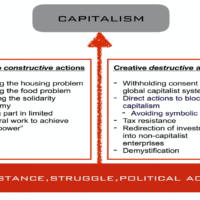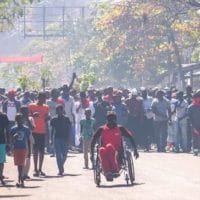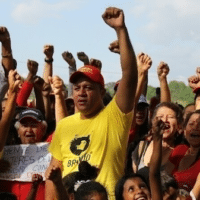-
Haiti’s Revolutions and Revisions: An Interview with Charles Forsdick and Christian Høgsbjerg
Toussaint stressed that freedom was something that had to be fought for and taken from below by the masses themselves.
-
Rinky-Dink Revolution
During this fierce period of history, many people want clarity and leadership in suggesting concrete steps toward ending the daily oppressions of capitalism. We seek a path leading to a post-capitalist society that aims not to destroy mother earth, humanity, and other life forms. If that doesn’t happen, we face an ongoing transition to fascism and an accelerating environmental catastrophe.
-
It takes a revolution to make a solution
I admit upfront that this is a hard newsletter to read. It is about debt. There is a bloodless quality to the way that we talk about the debt of the poorer nations. There is nothing poetic here. The numbers are alienating, their outcome shocking.
-
Major Lazer – ‘Get Free’ feat. Amber (of Dirty Projectors)
The speaker is too poor to move to a different region, so they can only move slightly farther away from an inevitable problem.
-
Cuba: from AIDS, Dengue, and Ebola to COVID-19
Cuba’s preparation for COVID-19 began on January 1, 1959. On that day, it laid the foundations for what would become the discovery of novel drugs, bringing patients to the island, and sending medical aid abroad. Coping with HIV/AIDS, dengue fever and Ebola helped Cuba develop the ability to cope with pandemics, both internally and abroad.
-
Mariátegui: A South American revolutionary
Hardly anyone in Australia has heard of José Carlos Mariátegui. Yet in South America he holds an important place in revolutionary history.
-
Isabelle Garo on Marx’s strategic thought and the spirit of revolt
The present context in France and across the world is quite bad for the exploited and oppressed in general, as also for the organised workers’ movement. This long term weakening in the conditions of capitalist crises gave the green light to the ruling classes to take out their revenge at the end of the 1970s and wind back the limited but real social gains of the post-war period.
-
When will the Winter come to an end?
On 17 January, Iran’s Supreme Leader, Ayatollah Ali Khamenei, led the Friday prayers for the first time in eight years. He mocked the ‘American clowns’ who threatened Iran and said that Iran’s response to the U.S. assassination of Major General Qassem Soleimani was a ‘slap in the face’ of U.S. power.
-
We are the ones who will awaken the dawn
Millions of people are on the streets, from India to Chile. Democracy is both their promise and it is what has betrayed them. They aspire to the democratic spirit but find that democratic institutions–saturated by money and power–are inadequate. They are on the streets for more democracy, deeper democracy, a different kind of democracy.
-
The vanguard of Chavism has a woman’s face: A chronicle of their resistance in 2019
In the middle of the year, we Venezuelans received a visit from the UN High Commissioner for Human Rights, Michel Bachelet, on the occasion of meeting with the different political actors in the country to “evaluate” the complex economic and social environment brought about by the White House’s decision.
-
A letter to intellectuals who deride revolutions in the name of purity
The ‘stubborn class struggle’ inside the revolutionary process should provide someone who is not part of the revolutionary process itself to be sympathetic not to this or that policy of a government, but to the difficulty—and necessity—of the process itself.
-
World scientists’ warning of a climate emergency
Most public discussions on climate change are based on global surface temperature only, an inadequate measure to capture the breadth of human activities and the real dangers stemming from a warming planet. Policymakers and the public now urgently need access to a set of indicators that convey the effects of human activities.
-
Changing the subject
From Chile to Lebanon, young people are demonstrating—in street protests and voting booths—that they’ve had enough of being disciplined and punished by the current development model.
-
The revolution isn’t being televised
It’s all kicking off everywhere in 2019. Haitians are revolting against a corrupt political system and their President Jovenel Moïse, who many see as a kleptocratic U.S. puppet. In Ecuador, huge public manifestations managed to force President Lenín Moreno to backtrack on his IMF-backed neoliberal package that would have sharply cut government spending and increased transport prices (FAIR.org, 10/23/19).
-
The struggle to live in the present
In Capital Is Dead, Mckenzie Wark argues that the dominance of the capitalist class may be ending. In order to grasp this epochal transition, leftists must follow the young Marx—and abandon or adapt inherited modes of thought.
-
“Down with the Rebels Against the Bill of Sale!”: Guy Endore’s Radical Reimagining of Haiti and Revolution
The American occupation of Haiti lasted from 1915–34. The U.S. subjected Haitians to the hated forced labor system of the corvée, seized control over Haitian finance, and rewrote the Haitian Constitution at gunpoint, enabling foreign companies to acquire land in the country. The distorting and oppressive impacts of the U.S. occupation have been felt in Haitian society ever since.
-
What did Engels say about revolution?
Engels was a revolutionary democrat and a revolutionary realist, argues Dragan Plavšić
-
In Venezuela, social, popular and communal unity is not an illusion
The Corriente Revolucionaria Bolívar y Zamora interviewed Ángel Prado, the spokesperson of the Socialist Commune El Maizal, a campesino organization dedicated to building socialism at the grassroots level in Venezuela.
-
The digital revolution and its discontents
In this talk, Tanner Mirrlees scrutinizes the rhetorics of “technological optimism,” “technological pessimism,” and “technological revolutionism,” discusses the political economy of communication, highlights how capitalism’s basic logics endure in the “digital age,” and concludes with an overview of how workers, citizens, and publics are trying to redesign and rebuild the digital age in support of working class power, participatory democracy, and social justice.
-
The limit does not exist
An interview with Marxist philosopher Joshua Moufawad-Paul about the science of revolution at a time when socialism is supposedly becoming mainstream.




















